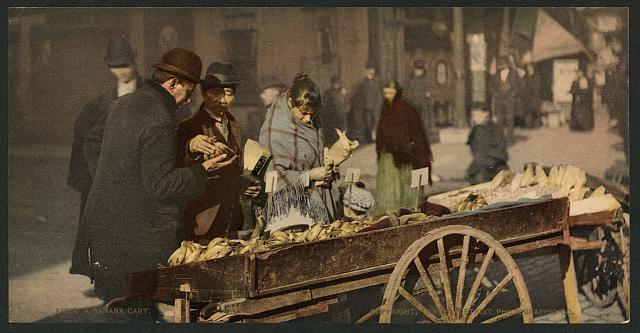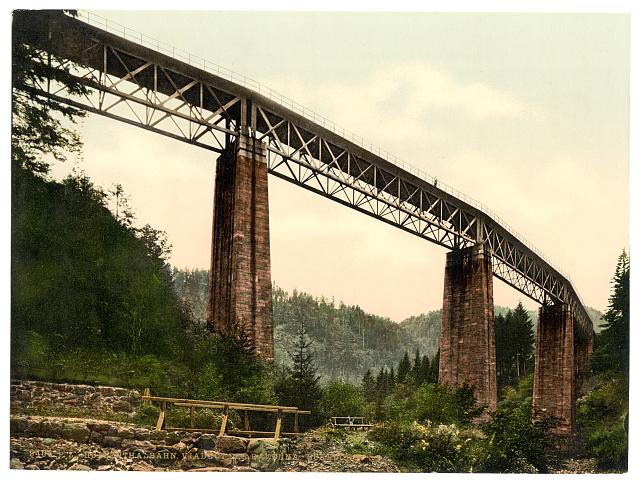By Dr. Peter Hill (Northumbria University)
This post introduces a series of short pieces on the overarching theme of ‘Political Economy and Culture in Global History’, which will appear over the following weeks on the Past & Present blog. The pieces derive from a collective discussion project of the same name, convened by Peter Hill (Northumbria University), and Andrew Edwards and Juan Neves-Sarriegui (both at the University of Oxford). This project has run over the past two years, supported by the Past & Present Foundation and our respective institutions. It brought together a range of scholars broadly interested in asking ‘big questions’ in world history – mainly early-career historians, but with a leavening of more senior academics and of scholars working in other disciplines, including anthropology, geography, literature, and economics.

Banana vendor’s cart in New York, image supplied by Peter Hill, via Library of Congress (image in the public domain)
The original stimulus for the project was a certain discontent with aspects of recent ‘global history’ – notably its apparent difficulties in dealing with questions of power and structure – as well as a reluctance to abandon the project entirely for smaller-scaled histories. We set out, instead, to revisit an earlier set of debates of the 1960s to the 1980s, about ‘transitions’ and ‘articulations’ between modes of production, dependency, and world-systems. We remained sceptical of many of the answers these debates had offered, and the ‘clunky’ vocabulary they adopted. But it seemed to us that the questions they posed had not gone away, though other questions also needed to be placed alongside them – especially, those of social reproduction, ecology, and the cultural construction of values. We still needed an approach which could do justice to both the interdependence of different areas and entities, and to unevenness and inequalities between them. We also still wanted to ask the big ‘why’ questions of historical change.
We pursued these broad lines of inquiry across a wide variety of topics and themes, and in what was (we hope) a spirit of mutual collaboration. The format we chose was that of a reading group: one or two people were responsible for setting and introducing the readings for each session, but the great majority of time was spent on general discussion, of which detailed minutes were taken. The themes discussed (along with the reading lists) can be sampled on the project website: they were deliberately general in scope, including titles such as ‘Global Capitalism, Slavery, and Reproduction’, ‘Structure and Culture’, and ‘Law, Status, and Power’. This helped to produce a forum in which nobody was an expert: anyone could bring an example to the table, from their own specialist knowledge or elsewhere, but the questions posed were general.

Ravenna Viaduct, c. 1900, image supplied by Peter Hill, via Library of Congress (image in the public domain)
For the present blog series, people who participated in the project, or followed it from afar via circulation of the minutes, have been asked to write reflections on the discussions as short papers. Some cover particular themes raised in the discussions – the relationship between culture and power, or the US ‘transition’ to capitalism, for instance – while others offer more general overviews, such as Mark Philp’s piece on ‘international political economy’, which initiates the series.
The blog series accompanies a virtual special issue of the journal Past & Present, on the theme of ‘Capitalism in Global History’, to be launched in October. This presents a selection of eleven articles from the journal’s past archive, made freely available for a limited period, along with a newly written introduction by the editors, who are also the convenors of the discussion project: Andrew Edwards, Peter Hill, and Juan Neves-Sarriegui. Through a particular reading of back issues of Past & Present, a journal founded on the attention to ‘big questions’ in history, we retrace some steps taken by the past debates which most interest us, and point out future directions which our project has suggested.
In the collaborative spirit in which the project was conceived, we invite readers to contact us with comments, questions, and criticisms. We hope, by presenting some of our reflections in this forum, to extend our network of people interested in the questions we are asking, and – amid the current circumstances of global (and uneven) pandemic – to find ways to continue the conversation.
This piece is the introduction to a series on Political Economy and Culture in Global History, derived from a collective discussion project of the same name, supported by the Past & Present Society (among others). These pieces accompany a virtual special issue of the journal Past & Present, which will be published in October 2020.
